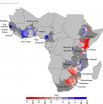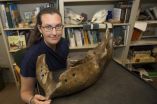(Press-News.org) VIDEO:
Largest gene discovery helps 'kick-start' new search for schizophrenia treatments - The discovery of over a hundred genetic risk factors linked to schizophrenia provides vital new clues in understanding what...
Click here for more information.
The discovery of over a hundred genetic risk factors linked to schizophrenia provides vital new clues in understanding what causes the condition and will kick-start the search for new treatments, according to leading UK scientists.
In the biggest molecular genetic study of schizophrenia ever conducted, the Psychiatric Genetics Consortium (PGC), led by Professor Michael O'Donovan from Cardiff University's MRC Centre for Neuropsychiatric Genetics and Genomics, combined all available schizophrenia samples into a new, single systematic analysis.
The study is the result of several years of work by the Schizophrenia Working Group of the Psychiatric Genomics Consortium, an international, multi-institutional collaboration of over 300 scientists in 35 countries worldwide.
"We've been able to detect genetic risk factors on a huge and unprecedented scale and shed new light on the biological cause of the condition," according to Professor O'Donovan who led the study.
Examining a total of 80,000 samples from schizophrenia patients and healthy volunteers worldwide the study, published in Nature, found 108 specific locations in the human genome linked to schizophrenia, 83 of which were entirely new.
The new findings also point to new biological mechanisms and pathways.
For example, as the authors had expected, the study implicates genes expressed in brain tissue but it also found genes associated with schizophrenia were particularly active in the immune system.
"These remarkable findings were only made possible through a global collaboration," according to Professor Sir Michael Owen, Director of Cardiff University's MRC Centre for Neuropsychiatric Genetics and Genomics.
"Detecting biological risk factors on this scale shows that schizophrenia can be tackled by the same approaches that have already transformed outcomes for people with other diseases.
"We now believe they can also do so for schizophrenia which has, until now, been so poorly understood," he added.
Schizophrenia is a debilitating psychiatric disorder that affects more than 24M people worldwide.
The disorder is very variable but is characterised by a combination of hallucinations, delusions such as paranoia, mood changes, apathy and social withdrawal amongst others, and often emerges in the teens and early 20s.
Its lifetime impact on individuals and society is high, both in terms of years of healthy life lost to disability and in terms of financial cost.
Many respond well to treatment but, for a large number who do not respond the options are limited largely because the biological mechanisms underlying schizophrenia have not been understood.
Professor O'Donovan now hopes the wealth of new findings will help kick-start the search for new treatments
He added: "Although we are very excited by the findings, it is important not to overstate or misinterpret them.
"We are still in the early days of trying to understand what causes the disease however collaborations like this and new genetic tools mean we find ourselves in a unique position.
"Reaping the full benefits of this research for treatment will be a medium to long game but since some of our findings point to already known targets for existing treatments, it is reasonable to hope that others might similarly do in a shorter time frame.
"The wealth of new findings provides a huge number of launch pads for understanding the disease and will kick-start the stalled process of developing new treatments for patients and their families who are even now still stigmatised and blamed for the condition.
"The key challenge now is to translate these new insights into the biological basis of schizophrenia, into new diagnostic tools and novel treatments for patients and finally put an end to the 60-year-wait for new treatments for sufferers worldwide."
INFORMATION:
Biological Insights From 108 Schizophrenia-Associated Genetic Loci by the Schizophrenia Working Group of the Psychiatric Genomics Consortium was published in Nature. DOI: 10.10.38/nature13595
The paper is available on request.
For further information or to arrange a media interview with Professor Michael O'Donovan or Professor Mike Owen, please contact:
Heath Jeffries
Public Relations
Cardiff University
Tel: 029 20 870917
E-mail: jeffrieshv1@cardiff.ac.uk
Cardiff University
Cardiff University is recognised in independent government assessments as one of Britain's leading teaching and research universities and is a member of the Russell Group of the UK's most research intensive universities. Among its academic staff are two Nobel Laureates, including the winner of the 2007 Nobel Prize for Medicine, University Chancellor Professor Sir Martin Evans. Founded by Royal Charter in 1883, today the University combines impressive modern facilities and a dynamic approach to teaching and research. The University's breadth of expertise encompasses: the College of Arts, Humanities and Social Sciences; the College of Biomedical and Life Sciences; and the College of Physical Sciences and Engineering, along with a longstanding commitment to lifelong learning. Cardiff's four flagship Research Institutes are offering radical new approaches to cancer stem cells, catalysis, neurosciences and mental health and sustainable places.
Largest gene discovery 'kick-starts' new search for schizophrenia treatments
2014-07-22
ELSE PRESS RELEASES FROM THIS DATE:
International team sheds new light on biology underlying schizophrenia
2014-07-22
July 21, 2014 (Toronto) – As part of a multinational, collaborative effort, researchers from Canada's Centre for Addiction and Mental Health (CAMH) have helped identify over 100 locations in the human genome associated with the risk of developing schizophrenia, in what is the largest genomic study published on any psychiatric disorder to date. The findings, published online in Nature, point to biological mechanisms and pathways that may underlie schizophrenia, and could lead to new approaches to treating the disorder, which has seen little innovation in drug development ...
LSU's Mark Batzer contributes to Nature Genetics article on marmoset genome
2014-07-21
BATON ROUGE – LSU's Mark Batzer, Boyd Professor and Dr. Mary Lou Applewhite Distinguished Professor in Department of Biological Sciences in the College of Science, contributed to an article in the scientific journal Nature Genetics, titled "The Common Marmoset Genome Provides Insight into Primate Biology and Evolution," published on July 20.
Batzer contributed analysis of "jumping genes," or mobile elements that move by a sort of "copy and paste" mechanism in the genome. The marmoset is important because it is the first "New World" monkey genome to be sequenced.
An ...
Temple study compares deep vein thrombosis therapies
2014-07-21
(Philadelphia, PA) – Patients who have a clot in their legs and are considering whether to be treated with traditional blood-thinning medication or undergo a minimally-invasive catheter-based clot removal procedure should feel comfortable that there is no difference in death rates between the two treatments, although there are more bleeding risks with the catheter procedure, according to a study by Temple University School of Medicine researchers. The study involved a review of more than 90,000 cases nationwide.
Riyaz Bashir, MD, a specialist in interventional cardiology ...
'Moral victories' might spare you from losing again
2014-07-21
It's human nature to hate losing.
Unfortunately, it's also human nature to overreact to a loss, potentially abandoning a solid strategy and thus increasing your chances of losing the next time around.
That's one conclusion of a Brigham Young University study published this week by the journal Management Science. The finding is based on an analysis of two decades of data on NBA coaching decisions.
The researchers focused on whether coaches adjusted their personnel following games where the margin of victory or defeat was small. After narrow wins, coaches changed their ...
Water, water -- not everywhere: Mapping water trends for African maize
2014-07-21
Today's food production relies heavily on irrigation, but across sub-Saharan Africa only 4 percent of cultivated land is irrigated, compared with a global average of 18 percent. Small-scale farming is the main livelihood for many people in the region, who depend on rainfall to water their crops.
To understand how climate change may affect the availability of water for agriculture, researchers at Princeton University analyzed trends in the water cycle in maize-growing areas of 21 African countries between 1979 and 2010. The team examined both levels of rainfall and the ...
Global warming 'pause' since 1998 reflects natural fluctuation
2014-07-21
Statistical analysis of average global temperatures between 1998 and 2013 shows that the slowdown in global warming during this period is consistent with natural variations in temperature, according to research by McGill University physics professor Shaun Lovejoy.
In a paper published this month in Geophysical Research Letters, Lovejoy concludes that a natural cooling fluctuation during this period largely masked the warming effects of a continued increase in man-made emissions of carbon dioxide and other greenhouse gases.
The new study applies a statistical methodology ...
Mammoth and mastodon behavior was less roam, more stay at home
2014-07-21
Their scruffy beards weren't ironic, but there are reasons mammoths and mastodons could have been the hipsters of the Ice Age.
According to research from the University of Cincinnati, the famously fuzzy relatives of elephants liked living in Greater Cincinnati long before it was trendy – at the end of the last ice age. A study led by Brooke Crowley, an assistant professor of geology and anthropology, shows the ancient proboscideans enjoyed the area so much they likely were year-round residents and not nomadic migrants as previously thought.
They even had their own ...
NIH-supported scientists demonstrate very early formation of SIV reservoir
2014-07-21
WHAT:
Scientists have generally believed that HIV and its monkey equivalent, SIV, gain a permanent foothold in the body very early after infection, making it difficult to completely eliminate the virus even after antiretroviral therapy has controlled it. Now NIH-supported researchers report that SIV can become entrenched in tissues fewer than 3 days after infection, before the virus is detectable in blood plasma (the liquid part) or blood cells.
Led by Dan H. Barouch, M.D., Ph.D., of Beth Israel Deaconess Medical Center and the Ragon Institute, in collaboration with ...
National survey from AP-NORC examines perceptions of health care provider quality
2014-07-21
Chicago, July 20, 2014—The Associated Press-NORC Center for Public Affairs Research has released the results of a major survey examining the public's opinions about what it means to be a quality health care provider in the United States. The survey, funded by the Robert Wood Johnson Foundation, sheds new light on how American adults perceive the quality of their health care and doctors, as well as the information they use and trust when making health care decisions. The survey produces new and actionable data during a crucial period of Affordable Care Act (ACA) implementation. ...
Try, try again? Study says no
2014-07-21
CAMBRIDGE, MA -- When it comes to learning languages, adults and children have different strengths. Adults excel at absorbing the vocabulary needed to navigate a grocery store or order food in a restaurant, but children have an uncanny ability to pick up on subtle nuances of language that often elude adults. Within months of living in a foreign country, a young child may speak a second language like a native speaker.
Brain structure plays an important role in this "sensitive period" for learning language, which is believed to end around adolescence. The young brain is ...




